|
XOOPS 2.5.6
Final
|
|
XOOPS 2.5.6
Final
|

Public Member Functions | |
| addBlankElement ($element) | |
| addElement ($element, $type, $contents, $attr_includes=array(), $attr=array()) | |
| addElementToContentSet ($element, $type) | |
| getChildDef ($def) | |
| makeLookup ($list) | |
| mergeInAttrIncludes (&$attr, $attr_includes) | |
| parseContents ($contents) | |
| setup ($config) | |
Public Attributes | |
| $attr_collections = array() | |
| $content_sets = array() | |
| $defines_child_def = false | |
| $elements = array() | |
| $info = array() | |
| $info_attr_transform_post = array() | |
| $info_attr_transform_pre = array() | |
| $info_injector = array() | |
| $info_tag_transform = array() | |
| $name | |
| $safe = true | |
Represents an XHTML 1.1 module, with information on elements, tags and attributes.
Definition at line 18 of file HTMLModule.php.
| HTMLPurifier_HTMLModule::addBlankElement | ( | $element | ) |
Convenience function that creates a totally blank, non-standalone element.
| $element | Name of element to create |
Definition at line 153 of file HTMLModule.php.
Referenced by HTMLPurifier_HTMLModule_Tidy\populate(), HTMLPurifier_HTMLModule_Name\setup(), HTMLPurifier_HTMLModule_Target\setup(), HTMLPurifier_HTMLModule_TargetBlank\setup(), HTMLPurifier_HTMLModule_Nofollow\setup(), and HTMLPurifier_HTMLModule_Legacy\setup().
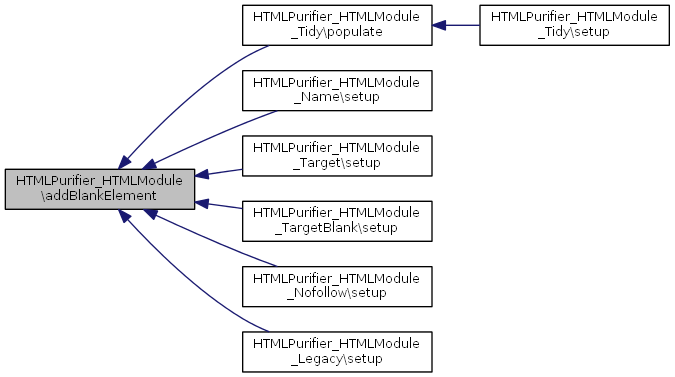
| HTMLPurifier_HTMLModule::addElement | ( | $element, | |
| $type, | |||
| $contents, | |||
$attr_includes = array(), |
|||
$attr = array() |
|||
| ) |
Convenience function that sets up a new element
| $element | Name of element to add |
| $type | What content set should element be registered to? Set as false to skip this step. |
| $contents | Allowed children in form of: "$content_model_type: $content_model" |
| $attr_includes | What attribute collections to register to element? |
| $attr | What unique attributes does the element define? |
Definition at line 130 of file HTMLModule.php.
References $type, addElementToContentSet(), HTMLPurifier_ElementDef\create(), mergeInAttrIncludes(), and parseContents().
Referenced by HTMLPurifier_HTMLModule_SafeEmbed\setup(), HTMLPurifier_HTMLModule_Tables\setup(), HTMLPurifier_HTMLModule_Hypertext\setup(), HTMLPurifier_HTMLModule_Edit\setup(), HTMLPurifier_HTMLModule_Ruby\setup(), HTMLPurifier_HTMLModule_Proprietary\setup(), HTMLPurifier_HTMLModule_Image\setup(), HTMLPurifier_HTMLModule_SafeObject\setup(), HTMLPurifier_HTMLModule_Object\setup(), HTMLPurifier_HTMLModule_Bdo\setup(), HTMLPurifier_HTMLModule_Iframe\setup(), HTMLPurifier_HTMLModule_Forms\setup(), HTMLPurifier_HTMLModule_Presentation\setup(), HTMLPurifier_HTMLModule_List\setup(), HTMLPurifier_HTMLModule_Text\setup(), and HTMLPurifier_HTMLModule_Legacy\setup().
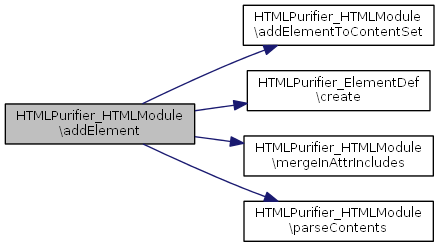
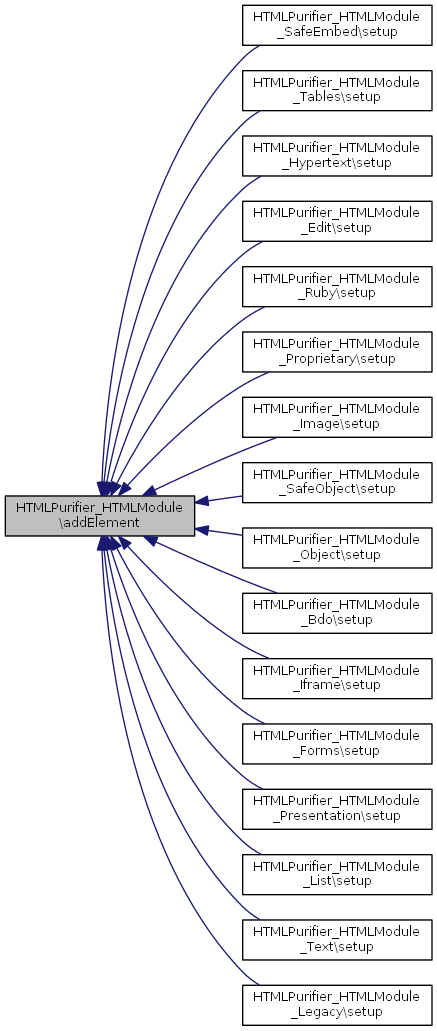
| HTMLPurifier_HTMLModule::addElementToContentSet | ( | $element, | |
| $type | |||
| ) |
Convenience function that registers an element to a content set
| Element | to register |
| Name | content set (warning: case sensitive, usually upper-case first letter) |
Definition at line 170 of file HTMLModule.php.
References $type.
Referenced by addElement().
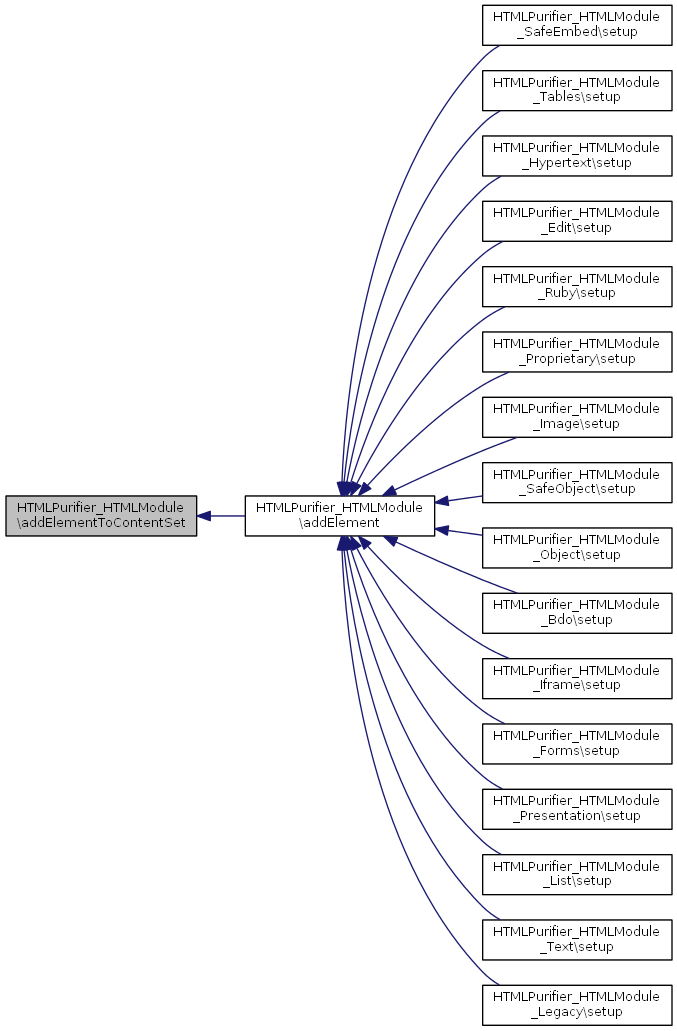
| HTMLPurifier_HTMLModule::getChildDef | ( | $def | ) |
Retrieves a proper HTMLPurifier_ChildDef subclass based on content_model and content_model_type member variables of the HTMLPurifier_ElementDef class. There is a similar function in HTMLPurifier_HTMLDefinition.
| $def | HTMLPurifier_ElementDef instance |
Definition at line 112 of file HTMLModule.php.
| HTMLPurifier_HTMLModule::makeLookup | ( | $list | ) |
Convenience function that generates a lookup table with boolean true as value.
| $list | List of values to turn into a lookup |
Definition at line 224 of file HTMLModule.php.
References $ret.
Referenced by HTMLPurifier_HTMLModule_Forms\setup(), and HTMLPurifier_HTMLModule_Text\setup().

| HTMLPurifier_HTMLModule::mergeInAttrIncludes | ( | & | $attr, |
| $attr_includes | |||
| ) |
Convenience function that merges a list of attribute includes into an attribute array.
| $attr | Reference to attr array to modify |
| $attr_includes | Array of includes / string include to merge in |
Definition at line 208 of file HTMLModule.php.
Referenced by addElement().
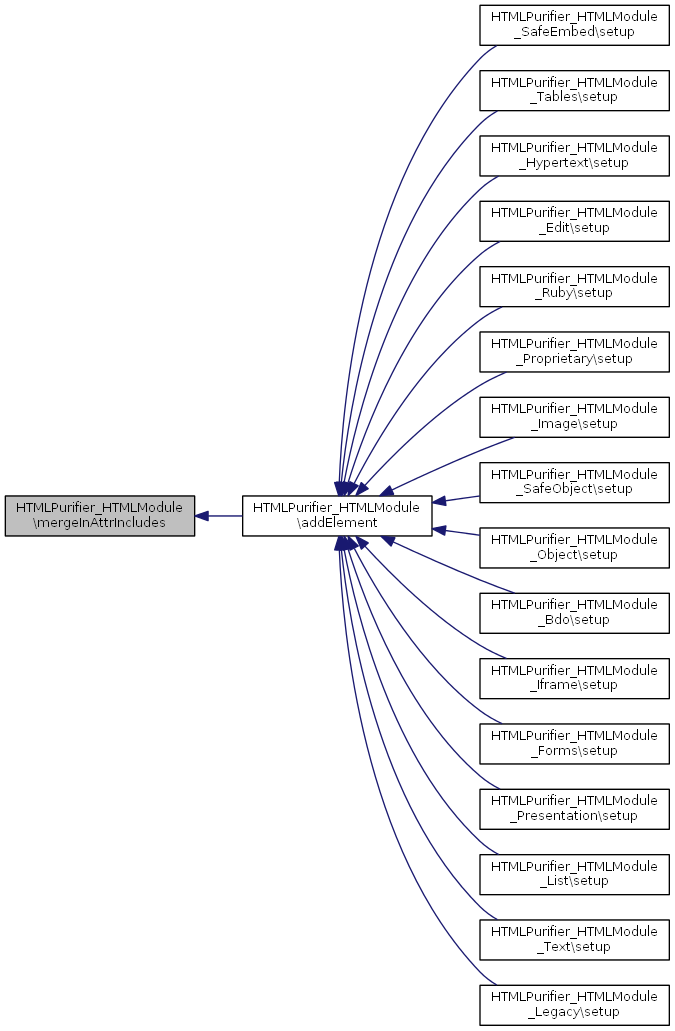
| HTMLPurifier_HTMLModule::parseContents | ( | $contents | ) |
Convenience function that transforms single-string contents into separate content model and content model type
| $contents | Allowed children in form of: "$content_model_type: $content_model" |
Definition at line 185 of file HTMLModule.php.
Referenced by addElement().
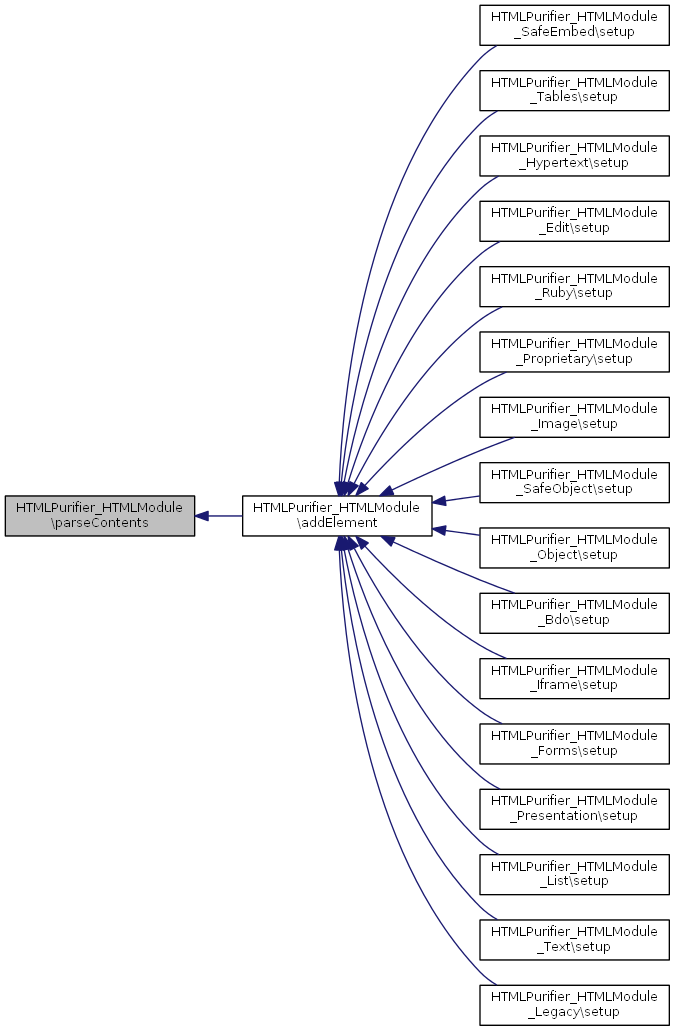
| HTMLPurifier_HTMLModule::setup | ( | $config | ) |
Lazy load construction of the module after determining whether or not it's needed, and also when a finalized configuration object is available.
| $config | Instance of HTMLPurifier_Config |
Definition at line 240 of file HTMLModule.php.
| HTMLPurifier_HTMLModule::$attr_collections = array() |
Associative array of attribute collection names to attribute collection additions. More rarely used for adding attributes to the global collections. Example is the StyleAttribute module adding the style attribute to the Core. Corresponds to HTMLDefinition's attr_collections->info, since the object's data is only info, with extra behavior associated with it.
Definition at line 57 of file HTMLModule.php.
| HTMLPurifier_HTMLModule::$content_sets = array() |
Associative array of content set names to content set additions. This is commonly used to, say, add an A element to the Inline content set. This corresponds to an internal variable $content_sets and NOT info_content_sets member variable of HTMLDefinition.
Definition at line 47 of file HTMLModule.php.
| HTMLPurifier_HTMLModule::$defines_child_def = false |
Boolean flag that indicates whether or not getChildDef is implemented. For optimization reasons: may save a call to a function. Be sure to set it if you do implement getChildDef(), otherwise it will have no effect!
Definition at line 88 of file HTMLModule.php.
| HTMLPurifier_HTMLModule::$elements = array() |
Informally, a list of elements this module changes. Not used in any significant way.
Definition at line 32 of file HTMLModule.php.
Referenced by HTMLPurifier_HTMLModule_Name\setup(), and HTMLPurifier_HTMLModule_Target\setup().
| HTMLPurifier_HTMLModule::$info = array() |
Associative array of element names to element definitions. Some definitions may be incomplete, to be merged in later with the full definition.
Definition at line 39 of file HTMLModule.php.
| HTMLPurifier_HTMLModule::$info_attr_transform_post = array() |
List of HTMLPurifier_AttrTransform to be performed after validation.
Definition at line 72 of file HTMLModule.php.
| HTMLPurifier_HTMLModule::$info_attr_transform_pre = array() |
List of HTMLPurifier_AttrTransform to be performed before validation.
Definition at line 67 of file HTMLModule.php.
| HTMLPurifier_HTMLModule::$info_injector = array() |
List of HTMLPurifier_Injector to be performed during well-formedness fixing. An injector will only be invoked if all of it's pre-requisites are met; if an injector fails setup, there will be no error; it will simply be silently disabled.
Definition at line 80 of file HTMLModule.php.
| HTMLPurifier_HTMLModule::$info_tag_transform = array() |
Associative array of deprecated tag name to HTMLPurifier_TagTransform
Definition at line 62 of file HTMLModule.php.
| HTMLPurifier_HTMLModule::$name |
Short unique string identifier of the module
Definition at line 26 of file HTMLModule.php.
Referenced by HTMLPurifier_HTMLModule_Tidy\getFixType(), HTMLPurifier_HTMLModule_Tidy\populate(), and HTMLPurifier_HTMLModule_Tidy\setup().
| HTMLPurifier_HTMLModule::$safe = true |
Boolean flag whether or not this module is safe. If it is not safe, all of its members are unsafe. Modules are safe by default (this might be slightly dangerous, but it doesn't make much sense to force HTML Purifier, which is based off of safe HTML, to explicitly say, "This is safe," even though there are modules which are "unsafe")
Definition at line 102 of file HTMLModule.php.